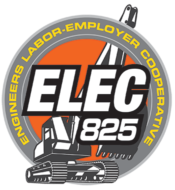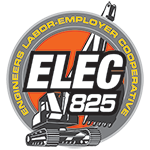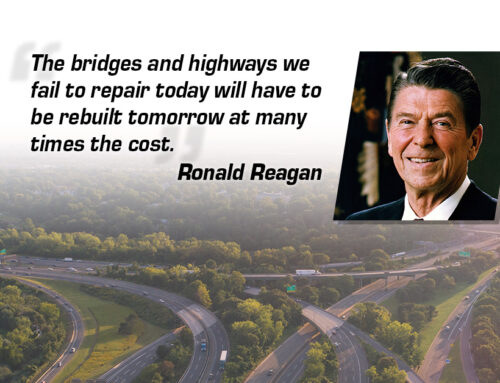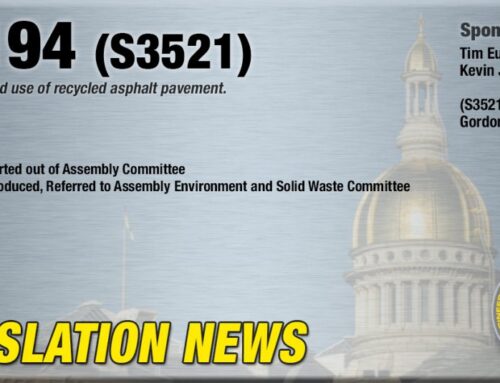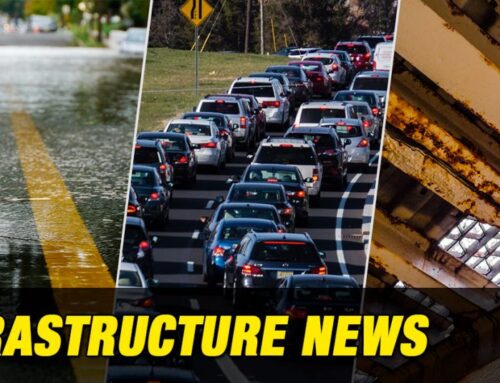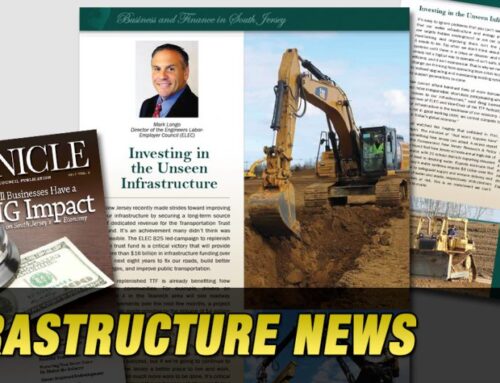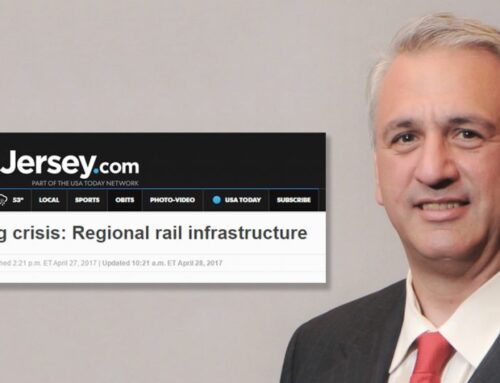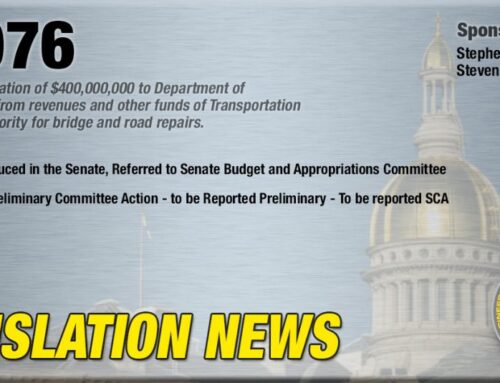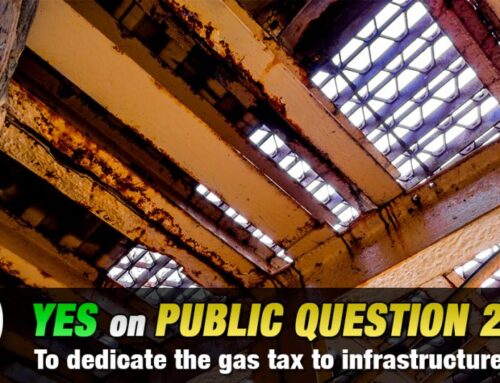This time next year we will have a new president in the White House who will make important decisions about the country’s transportation infrastructure. This includes New Jersey. It’s important to note that one of the few places where New Jersey gets money back from Washington is for transportation infrastructure. The recently upgraded Route 22 in Bridgewater, for example, was a $57 million dollar project funded almost entirely with federal funds; NJ residents paid only $100,000 for a vastly improved and safe stretch of road.
With that in mind, what follows is an alphabetical list of the presidential candidates and their opinions on transportation infrastructure. This includes policy positions presented on their campaign website, their legislative track record (for those that have held public office), and recent public statements. As you consider candidates, please think about their position on transportation infrastructure.
Note: ELEC825 does not endorse candidates for public office

Ben Carson (R)
Campaign Website
“Many Americans would not be surprised to discover that our country’s infrastructure is in a state of decline. Misused federal funds siphoned-off for other unrelated uses have depleted the funding intended to sustain our roads, bridges and electric grid. Fixing the U.S. infrastructure would become an urgent priority of a Carson presidency.”
SOURCE: https://www.bencarson.com/issues/issue/infrastructure-our-roads-bridges-and-electric-grid
Track Record
Has not held public office
Public Statements
“You know, the Europeans, they looked over here and they saw the Rockefellers, and the Vanderbilts, and the Fords, and the Kelloggs, and the Carnegies, and the Mellons, and they said you can’t run a country like that. You’ve gotta have an overarching government that receives all the funding and equity that redistributes it, so we actually inspired socialism. But all of those people that I just mentioned, they didn’t just hoard money and pass it down from generation to generation, they built the infrastructure of our country. They build the transcontinental railroads and seaports and textile mills and factories that enabled the development of the most powerful and dynamic middle class the world has ever seen, which rapidly propelled us to the pinnacle. That’s what we have to start thinking about once again.”
SOURCE: http://www.marketplace.org/2015/11/17/elections/full-interview-dr-ben-carson-economy

Hillary Clinton (D)
Campaign Website
“As a share of the economy, federal infrastructure investment is roughly half of what it was thirty-five years ago. Estimates of the size of our “infrastructure gap” register in the trillions of dollars. Workers can’t get to work, congestion keeps parents stuck in traffic, floods threaten our cities, and airports leave travelers stranded for hours or even days at a time. Our small businesses, farmers, and manufacturers face highways, waterways, ports, and airports that make it harder for them to get their products to customers. Meanwhile, countries like China are racing ahead, building projects that will drive commerce and growth in the 21st century.
That’s why Hillary Clinton is announcing a five-year $275 billion dollar infrastructure plan.
Clinton would increase federal infrastructure funding by $275 billion over a five-year period, fully paying for these investments through business tax reform. Of these funds, she would allocate $250 billion to direct public investment. She would allocate the other $25 billion to a national infrastructure bank, dedicated to advancing our competitive advantage for the 21st century economy. The bank would leverage its $25 billion in funds to support up to an additional $225 billion in direct loans, loan guarantees, and other forms of credit enhancement—meaning that Clinton’s infrastructure plan would in total result in up to $500 billion in federally supported investment. The bank would also administer part of a renewed and expanded Build American Bonds program, and would look for opportunities to work with partners in the private sector to get the best possible outcomes for the American people.
Clinton’s plan would create good-paying jobs today and drive up wages in the future.
According to the White House Council of Economic Advisers, every $1 billion in infrastructure investment creates 13,000 jobs. Moreover, the vast majority of the jobs created by infrastructure investment are good-paying, middle-class jobs — paying above the national median. And beyond creating good-paying jobs today, infrastructure investments promise to enhance the productivity of the American economy tomorrow — helping to boost the incomes of working Americans in the future. Every dollar of infrastructure investment leads to an estimated $1.60 increase in GDP the following year and twice that over the subsequent 20 years.”
SOURCE: https://www.hillaryclinton.com/briefing/factsheets/2015/11/30/clinton-infrastructure-plan-builds-tomorrows-economy-today/
Track Record
U.S. Senator (NY) from 2001-2009
- Served on Subcommittee on Transportation and Infrastructure (2007-2008)
- Voted YES on $60B stimulus package for jobs, infrastructure, & energy. (Sep 2008)
- Infrastructure investment creates jobs AND improves security. (Aug 2007)
SOURCE: http://www.ontheissues.org/Hillary_Clinton.htm
Public Statements
“To build a strong economy for our future, we must start by building strong infrastructure today…I want our cities to be in the forefront of cities anywhere in the world. I want our workers to be the most competitive and productive in the world. I want us, once again, to think big and look up, beyond the horizon of what is possible in America.”
SOURCE: http://www.cnn.com/2015/11/29/politics/hillary-clinton-infrastructure-spending/
“We should establish an infrastructure bank to put Americans to work building our roads, our bridges, our airports, our rails [and] our broadband networks”
SOURCE: http://thehill.com/policy/transportation/258064-clinton-calls-for-national-infrastructure-bank

Ted Cruz (R)
Campaign Website
“Let’s break the Washington Cartel and restore power to the people. Let’s stop handing over billions to federal favorites. We will sharply reduce the alphabet soup of government entities, beginning with the “ABC”s that should not exist in the first place: The Agencies, Bureaus, Commissions, and other programs that are constitutionally illegitimate and harmful to American households and businesses. The following 25 ABCs are emblematic of the types of government functions I will examine, downsize, and reform to limit federal overreach. But these are just a start.”
“Eliminate the following Agencies, Bureaus, Commissions, and programs:
New Starts Transit Program
Transportation Investment Generating Economic Recovery (TIGER)”
SOURCE: https://www.tedcruz.org/five-for-freedom/
Track Record
US Senator (TX), 2013-present
2013 – Nay on HR152Disaster Relief Appropriations Act (funds for Hurricane Sandy disaster relief)
SOURCE: https://votesmart.org/bill/15969/42340/135705/ted-cruz-voted-nay-passage-hr-152-disaster-relief-appropriations-act-2013#42340
2015 – Nay on HR22 “Fixing America’s Surface Transportation (FAST) Act”
SOURCE: https://votesmart.org/bill/20486/54061/135705/ted-cruz-voted-nay-passage-with-amendment-hr-22-fixing-americas-surface-transportation-fast-act#54061
2015 – Cosponsor “Transportation Empowerment Act”
“This bill prescribes a limitation on funding of transportation programs and projects for FY2016-FY2020.”
Source: https://www.congress.gov/bill/114th-congress/senate-bill/1541
Public Statements
No recent public statements found

John Kasich (R)
Campaign Website
“Not since the completion of the interstate highway system over two decades ago has there been a clear vision for the federal government’s role in surface transportation. John Kasich will direct policy authority, funding and responsibilities to the states, which are in the best position to assess infrastructure needs and develop strategies to manage them.”
SOURCE: https://johnkasich.com/resultsnow/
“Let’s start with infrastructure. The interstate system is longfinished, and states already oversee their own highway design and construction. Americans don’t need a costly federal highway bureaucracy. I will return the federal gas taxes to the states, leaving only a sliver with the federal government for truly national needs. Then, I will downsize the Transportation Department and reassign it a smaller role, supporting states with research and safety standards. Federal spending would go down, resources available for highways and transit could go up, and states could work faster.”
SOURCE: https://johnkasich.com/blog-posts/washington-post-john-kasich-washington-is-obsolete-resultsnow/
Track Record
Governor, Ohio, 1995-2001
“The exact impact of Kasich’s cuts to localities and education is hard to assess. But numerous local governments have had to eliminate jobs, raise taxes or cut back on services provided. Some have had to do all three. The city of Springfield, in southwestern Ohio, for instance, is no longer able to put $1 million a year toward its roads, nor can it invest in a downtown parking garage demanded by businesses, or an industrial park — at least not without raising taxes.”
SOURCE: http://www.governing.com/topics/elections/gov-john-kasich-ohio-enigma.html
Public Statements
“Kasich offered his proposed solution to the national infrastructure funding problem, arguing that states should be given greater authority to fund and maintain roads without oversight from the federal government.
‘Let’s keep our own money in our own states to do what we want with our own regulations, not with them scooping stuff off the top,’ Kasich said.
Kasich’s infrastructure plan, which he recently outlined for Time Magazine, calls for the federal government to dramatically slash its 18.4-cent gas tax, leaving just a few cents a gallon to fund interstate highways.
States, then, could move to raise their own gas taxes to meet local needs, provided local leaders agree on a rate.”
SOURCE: http://www.mlive.com/lansing-news/index.ssf/2015/09/gop_presidential_hopeful_john.html

Marco Rubio (R)
Campaign Website
“America could not have flourished in the 20th Century without up-to-date transportation infrastructure. Unfortunately, our infrastructure needs have evolved dramatically over 60 years, but the transportation system – and politicians in Washington – have not changed with them.
We successfully built a national highway system in the last century, but now we need local flexibility to address our diverse nation’s many different needs and problems. The federal gas tax feeds Washington’s overspending. Transportation dollars are taken from the states and funnelled through a Highway Trust Fund that is pillaged every year by Washington special interests. And decades-old federal red tape adds cost and stands in the way of innovative solutions.”
“Today, the Highway Trust Fund is running out of money, and the political establishments of both parties are propping it up with the same stale policies of the past. We can’t keep putting more money into this broken system. Marco will take a new approach in building the infrastructure for the next American century.”
“As President, Marco will:
Cut Outdated Gas Taxes
- Reduce the federal gasoline tax rate by 80 percent.
- Veto any gas-tax increase.
Empower States to Innovate
- Turn back control of the highways to the states, stopping special interests in Washington from building “Bridges to Nowhere” and engaging in other wasteful spending.
- Free states from the strings that come attached to federal funding.
- Remove barriers to public-private partnerships.
Find Common-Sense Savings
- Repeal the Davis-Bacon Act that inflates government costs by billions every year and is a giveaway of taxpayer dollars to labor unions.
- Phase out the Mass Transit Account, which loots the Highway Trust Fund.
- Stop diverting highway funds to unnecessary pet projects.”
SOURCE: https://marcorubio.com/issues-2/marco-rubio-transportation-policy-highways-roads/
Track Record
US Senator (FL), 2011-present
“In February 2011, Rubio voted for S.Amdt.14 to S.223, which proposed eliminating collective bargaining rights for the Transportation Security Administration.”
SOURCE: https://ballotpedia.org/Marco_Rubio_presidential_campaign,_2016
Florida House of Representatives, 2000-2008 (Speaker, 2006-2008)
“While serving in the Florida Legislature, Rubio supported the privatization of toll roads in 2007.”
SOURCE: https://ballotpedia.org/Marco_Rubio_presidential_campaign,_2016
Public Statements
“Among the encouraging aspects of the transportation bill is limited funding for transportation “enhancement” spending projects that, while helping beautify our roads, are not a wise use of already limited tax dollars. It also includes a measure I introduced to streamline and expedite multimodal projects. Finally, I’m also pleased two of my other amendments made it into the final bill. One would help states considering road construction on or adjacent to military bases for evacuation routes, while another would improve transparency requirements for projects of regional and national significance.
However, the bill as a whole still continues an overly dominant federal control of our nation’s highway system and relies on spending offsets spread out over 10 years for a two year bill. This means that Congress will likely have to appropriate more taxpayer dollars to bailout the Highway Trust Fund in the near future since gas tax revenues are falling.
In sum, while this bill does contain some worthy ideas – including the original RESTORE Act and the NFIP extension, among others – it still spends too much, relies on accounting gimmicks and does nothing to prevent American taxpayers from the looming bailout of the Highway Trust Fund.”
SOURCE: http://www.rubio.senate.gov/public/index.cfm/2012/6/my-vote-on-the-transportation-bill

Bernie Sanders (D)
Campaign Website
“America has one of the oldest rail systems in the world — woefully inadequate for a 21st-century society. Many of us may remember the images of the Minneapolis Bridge collapsing in Minnesota in 2007. Bernie sees rebuilding our infrastructure as a way to both create jobs and address the rampant infrastructure problems that are accumulating in our country.
Rebuild America’s Infrastructure: Our roads, bridges, dams, grids, and more have not kept up with the pace of our country’s growth, or the advances in technology. We have to take action.
Rebuilding Will Provide Jobs: Put Americans to work on addressing our infrastructure problems with well-paying jobs that will contribute to economic growth for families and communities across the country.”
“How can we afford investing $1 trillion in infrastructure?
We can’t afford not to! According to a report by the Congressional Budget Office (CBO), federal spending on transportation and water infrastructure since 2003 has decreased by 19 percent (23 percent with respect to new infrastructure) while only a 6 percent increase in spending on operations and maintenance has developed in its place. According to the aforementioned ACSE report:
24.9 percent of bridges are functionally obsolete or structurally deficient, over which more than 200 million trips are taken daily
42 percent of major urban highways are congested, costing us $101 billion annually and increasing carbon emissions
32 percent of roads are in poor or mediocre condition, which adds up to a cost of $324 per motorist every year
It’s clear that our infrastructure needs serious help. But where’s the money coming from?
The most important point is that rebuilding our infrastructure is an investment in our economic future. Independent studies show that, in the short-term, non-residential construction generates nearly twice as much economic activity as money spent ($1.92 per $1 spent). This means that for every dollar we put into our infrastructure, we get almost two dollars back in immediate economic impact. The long-term impact is even more significant at well over three times what we spend ($3.21 per $1 spent).
More, as Bernie has noted, the cost of the Iraq war — which included rebuilding much of the infrastructure that was destroyed — is now hovering at $1.7 trillion dollars. Bernie has introduced a number of bills to curb corporate tax dodging, which would account for over half of the required revenue in addition to the previously mentioned savings. Investing in infrastructure boosts our economy now and saves money long-term.”
“Rebuilding Will Provide Jobs
Bernie believes that the fastest way to create millions of jobs is to rebuild our crumbling infrastructure; he’s been saying so for decades! In his introduction to the The Rebuild America Act of 2015, he noted, “There’s a reason that investing in our infrastructure has traditionally enjoyed bipartisan support in Congress. It’s a good idea. It creates jobs, income, profits and tax revenues. It lays a foundation for the efficient operation of our economy in the future.”
How does investing in infrastructure help the economy?
Fixing our infrastructure would give American workers good-paying jobs, stimulate our economy, and boost our national productivity.
According to a research paper by Standard & Poor, infrastructure investment would create about 29,000 construction jobs for a mere $1.3 billion in spending, and many more jobs indirectly. Additionally it estimated a $2 billion growth in real GDP for the same amount, making it a deficit-negative investment.
Bernie has suggested a conservative estimate of 13 million good paying jobs for the 5-year, $1 trillion investment. Forbes, on the other hand, puts the estimate at closer to 27 million for a similar $1.2 trillion investment over 5 years.
Increased jobs result in increased spending among average Americans, which further stimulates economic growth in other sectors. Increased efficiency results in lower transportation costs, as well as saving companies and individual citizens money on both fuel and time. Last, but not least, increasing the safety and reliability of infrastructure prevents extended damage and emergency repairs, avoiding the costs of medical emergencies, related property damage, and human lives.
What has Bernie specifically proposed to improve our infrastructure?
Bernie recently introduced the The Rebuild America Act of 2015, which would invest $1 trillion over the next 5 years toward rebuilding and expanding on our country’s infrastructure.”
SOURCE: http://feelthebern.org/bernie-sanders-on-infrastructure/
Track Record
Mayor of Burlington VT, 1981-1989
Member US House of Representatives, 1991-2007
US Senator (VT), 2007-current
2015 – Authors The Rebuild America Act
SOURCE: http://www.budget.senate.gov/democratic/public/index.cfm/2015/1/investing-in-infrastructure-will-support-13-million-jobs
2015 – Yea on HR22 Fixing America’s Surface Transportation (FAST) Act
2013 – Yea on HR152 Disaster Relief Appropriations Act (funds for Hurricane Sandy disaster relief)
2011 – Yea on S1660 American Jobs Act of 2011
2011 – Yea on Economic Development Revitalization Act
SOURCE: https://votesmart.org/candidate/key-votes/27110/bernie-sanders/97/infrastructure#.VqeNtpMrLOY
Public Statements
“And yes, those folks and large corporations will have to pay under a Sanders administration more in taxes so that we can use that revenue to rebuild our crumbling infrastructure, create the jobs we need, make sure that every kid who has the ability is able to get a college education in America because public colleges and public universities will be tuition-free…”
SOURCE: http://www.cnn.com/2015/07/05/politics/bernie-sanders-raise-taxes/
“A progressive estate tax on multi-millionaires and billionaires is the fairest way to reduce wealth inequality, lower our $17 trillion national debt and raise the resources we need for investments in infrastructure, education and other neglected national priorities.”
SOURCE: http://www.huffingtonpost.com/rep-bernie-sanders/a-progressive-estate-tax_b_5784892.html

Donald Trump (R)
Campaign Website
No policy position on infrastructure
Track Record
Has never held public office
Public Statements
“We’ve spent $4 trillion trying to topple various people,” Trump said. “If we could’ve spent that $4 trillion in the United States to fix our roads, our bridges and all of the other problems — our airports and all of the other problems we’ve had — we would’ve been a lot better off. I can tell you that right now.”
SOURCE: https://www.washingtonpost.com/news/wonk/wp/2015/12/16/one-thing-donald-trump-got-right-about-how-the-u-s-is-spending-its-money/
“OUR INFRASTRUCTURE IS CRUMBLING
Our airports, bridges, water tunnels, power grids, rail systems— our nation’s entire infrastructure is crumbling, and we aren’t doing anything about it. According to engineers, one out of every nine bridges in this country is structurally deficient, approximately a quarter of them are already functionally obsolete, and almost a third of them have exceeded their design lives.
Some of these bridges have already collapsed. Our infrastructure is terrible, and it’s only getting worse and more expensive to fix. It’s already costing the American people an estimated $200 billion a year in reduced productivity.
Instead of being at the office or in the factory getting work done, Americans waste countless hours every day sitting in traffic jams or waiting for stalled trains. Our airports? Are you kidding me? A disgrace.
Our power grid, the infrastructure for electricity that keeps everything operating, is way out-of-date. Our highspeed Internet access is only 16th best in the world. When I travel internationally, I see magnificent places you wouldn’t believe. I see properly maintained bridges, tunnels, and airports. I see great highways and unbelievably efficient power systems. Then I come home and I get caught in traffic, and when the car moves, it bangs over potholes.
Why can’t we get these problems fixed? The answer is that the people we put in charge don’t know how to fix them.
We’re spending billions of dollars protecting countries that should be paying us to do the job yet we can’t build roads in our own cities. We can’t build schools in our own communities. I’ve been to China numerous times, and everywhere you look there are cranes reaching toward the sky. The Chinese build new cities over there in about 12 minutes, while we take years to get the permits to add a dormer window to our own homes.
The World Economic Forum ranks the US infrastructure as only the 12th best in the world. We don’t spend enough to fix, build, or maintain our “plant.” Europe and China spend as much as 9 percent of their GDP on infrastructure projects. We spend 2.4 percent.”
SOURCE: “Crippled America: How to Make America Great Again,” by Donald J. Trump
